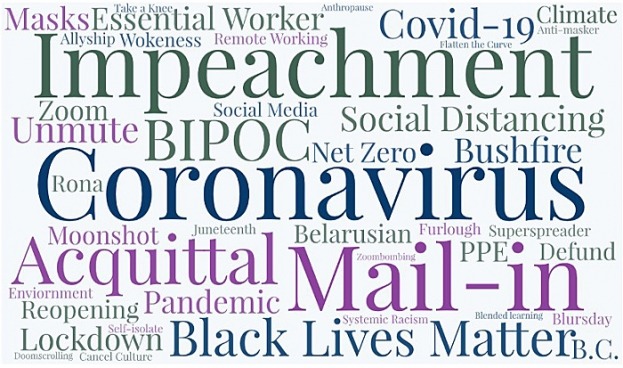
The deluge of events, the velocity of change, and the upheaval of our lives are mirrored in the language we use. Words, as a result, have both cultural and spiritual significance.
Every year, the Oxford English Dictionary's expert lexicographers choose a "Word of the Year." In 2018, it was "toxic" and in 2019, it was "climate emergency." We reflected on these choices in a post for this blog.
The Word of the Year is judged to reflect the ethos, mood, or preoccupations of the year and to also have lasting potential as a word of cultural import. We'd add that in our examination of past words, we have seen them as spotlighting spiritual challenges that sensitive and engaged people need to deal with.
Not surprisingly, in a year like 2020, the Oxford people found it impossible to settle on one word. This was a year of enormous turmoil brought on by the COVID-19 worldwide pandemic, protests in support of Black Lives matter, political polarization, economic distress, environmental destruction, and much more. Here are some of the chosen words listed in order of the months they became popular:
- bushfire
- impeachment
- acquittal
- coronavirus
- Covid-19
- lockdown
- social distancing
- reopening
- Black Lives Matter
- cancel culture
- BIPOC
- mail-in
- Belarusian
- moonshot
- superspreader
- net zero
A report, "2020: Words of an Unprecedented Year" about how and why these words were chosen is available from the Oxford English Dictionary on their website. It also covers additional words in the language of Covid-19, technology and remote working, the environment, social movements and social media, and other topics.
Also interesting this year are words that we should stop using or shift how we are using them. In its latest update, summarized here, Dictionary.com says we should now:
- capitalize Black
- put people first by using gay, instead of homosexual
- destigmatize addiction and suicide, by saying person addicted to or end one's life
- define animals we depend on, by adding terms such as emotional support animal or therapy animal
Reviewing the words you use in your conversations will deepen and enrich your adventuresome search for meaning. Because, as Ann Bedford Ulanov was quoted as saying in Dear Heart, Come Home by Joyce Rupp:
"Meaning does not come to us in finished form, ready-made; it must be found, created, received, constructed. We grow our way toward it."





No comments:
Post a Comment
Note: Only a member of this blog may post a comment.